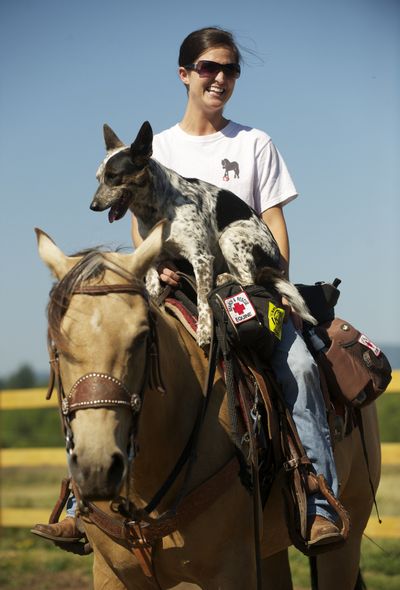Horses ready for rescue work
Equine search team helps sheriff’s office

VANCOUVER, Wash. – The call Mandy Wilson had been training for came Tuesday afternoon: A hiker was lost on Mount Adams.
Wilson packed her first-aid kit, outdoor gear and other supplies. She checked her truck and told her husband about the impending expedition.
And unlike most other volunteers mobilized around Southwest Washington that day, she also readied a saddle and bridle.
Wilson never loaded up Sugar, her trusted mare, because the lost hiker was spotted by searchers Tuesday night, before she mobilized. But the founder of Clark County’s newest equine search-and-rescue team was ready for her first emergency deployment. The team has trained since March.
The Dauntless Equine Response Team is made up of 12 active volunteer riders and their horses, half of whom are already certified to go on searches. They are among the hundreds of volunteers who aid the Clark County Sheriff’s Office in searching for missing people.
There are only about 10 other horseback search teams around the state, said Bill Gillespie, president of Washington’s Search and Rescue Volunteer Advisory Council.
One of them is the Clark County Mounted Search and Rescue, of which Wilson was a member before starting this new team.
The group is sure to be called in again, said Clark County sheriff’s Deputy Bob Carder. He is a search-and-rescue coordinator for the Sheriff’s Office.
“We’re turning more and more toward using equestrian searchers,” Carder said. “They can go a lot longer distance.”
Riders also have a higher – and therefore better – vantage point than searchers on foot, he said.
Horses are great for packing gear for searchers, and they cover distances about twice as fast as pedestrian teams, said Gillespie, the head of the advisory council. And they can do some of the actual searching, if not with the same acuity as trained search dogs, he said.
“Horses have a sense that something is out there,” Gillespie said.
The new team’s founder agreed. Horses pick up unusual scents – such as an unconscious human hidden from sight by foliage, for example – and they detect movement, Wilson said.
“When you’re out riding on trails, horses let you know when they sense something,” she said.
Usually, a trail rider would train a horse to soldier on and not worry about every scent or unusual sight. But Wilson has taken to not correcting Sugar, encouraging the horse to let its rider know when something’s not quite right.
The ideal search-and-rescue horse is one that’s in good shape mentally and physically, Wilson said.
It needs to be calm and used to working around flashing lights, barking dogs and crackling underbrush.
This week, Sugar stood in the small riding arena behind Wilson’s house. The horse’s head hung low in the hot sun. Her ears drooped. The big eyelids lowered.
“She looks really out of it right now,” Wilson said with a caring smile toward her steed. “But she’s ready to give me eight hours of work.”
A few minutes before, when Wilson sat astride Sugar, she whistled to her sheep-dog mix, Annie. The agile hound leaped up on the saddle. Sugar never moved a muscle.
Some horses might need a little more training not to be flustered in that scenario. And that’s okay; they’re getting that with Dauntless.
Wilson has been in touch with search-dog teams in Clark County, she said. Several dog owners have offered to hold combined training sessions.